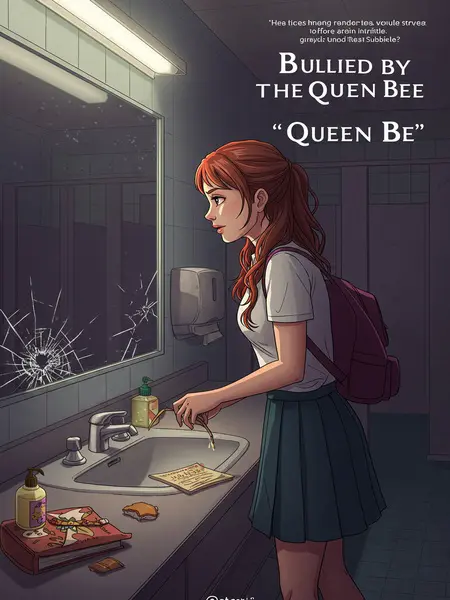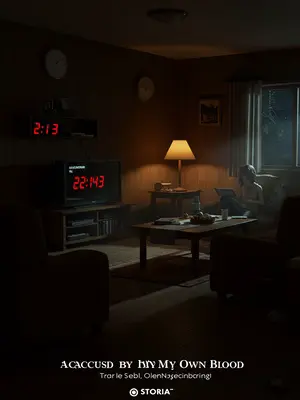Chapter 3: The Making of a Scapegoat
I was in my first year of high school, having only transferred in March. Ohio’s spring was all mud and chill, the front yard still patchy with snow when I showed up at my new school, dreading every step.
My mom finally won her three-year divorce case, moved my records out, and brought me back to our old hometown to hide. We crammed our lives into cardboard boxes, her old sedan rattling all the way. Home meant peeling paint, empty storefronts, and the kind of small-town gossip that never dies.
My dad owed money to loan sharks. Debt collectors showed up at our door almost daily. Sometimes I’d wake to the phone ringing after midnight—my mom whispering, begging for one more extension. Strangers painted our porch steps red, taped flyers with our names to the mailbox. It felt like everyone was watching us drown.
Even at school, I couldn’t escape. My mom is timid—just a little trouble makes her anxious. She checked the locks three times every night, flinched at the doorbell, and signed my permission slips with trembling hands. She hoped the new school would be a safe haven for me, somewhere I could start over.
She told me not to let our family’s mess define me. "Study hard, June. Don’t let your father’s mistakes become yours."
At first, I believed her. I filled out my planner, set my alarm for dawn, tried to be invisible. But invisibility didn’t protect me. Somehow, it made me a bigger target.
I wasn’t pretty. Chubby, acne-splotched, glasses always slipping down my nose. My jeans were from Goodwill, my sneakers from last year’s clearance bin. I tried to blend in, but it was useless.
Aubrey Langley, my new deskmate, was everything I wasn’t. Daughter of the richest man in the county, always put together—even on Mondays. Her accessories matched her mood, her laughter floating across the room. She was the teacher’s favorite, with perfect grades and glittery gel pens. I envied her without even realizing it.
At first, I thought we were becoming friends. She’d ask me to open the classroom door for her, promising Starbucks in return. I woke up early, braved the cold, and thought maybe—just maybe—I’d finally found someone who wanted me around.
But then things started to go missing. First a pen, then a notebook, then money. The security camera in our classroom was just for show. Every time something disappeared, the rumors started up again.
Aubrey would stand in the hallway, comforting the others. "I lost over a hundred bucks, but it’s okay—Mr. Peterson said he’ll handle it."
She played both sides, telling everyone how helpful I was, but planting the idea that I was the thief. “Before she transferred, nothing was ever stolen, right?”
The crowd’s suspicion landed on me. Someone said, "Aubrey, don’t be too nice. She pretends to help but she’s just coming early to steal."
Rumors multiplied: my dad in jail, my mom running off, me shoplifting at the mall. The label stuck, no matter what I did.
Mr. Peterson decided to let the class vote on the thief. The ballots piled up with my name. He called me to the office, told me to confess for the good of the class. “Sometimes the facts don’t matter. Why does the whole class insist it’s you?”
He made me write a 5,000-word apology and read it out loud. I stood at the front of the class, voice shaking, tears streaming down my face. The silence was thick, broken only by snickers and whispers. "Her dad went to jail for stealing—now she’s following in his footsteps."
I tore up the apology at the door. I walked to the front and shouted, “I’ve never stolen anything! Why do you say it was me? None of you saw it!”
My voice broke. I sobbed, chest heaving. “My dad didn’t go to jail, he just owes money! My parents are good people. Why treat me like this?”
No one cared. Aubrey put a hand on my shoulder, her voice feather-light: “Just don’t do it next time. Everyone will forgive you.”
She never gave me the key again. From then on, every time something went missing, I got blamed. Even when things were found later, they’d say, “Just because she didn’t steal this time, doesn’t mean she didn’t steal before.”
Aubrey started messing with me for fun. She’d write insults in my homework, loosen my chair screws, and once, ripped my jeans so my old leggings showed. Nobody warned me. Whenever I stood to answer questions, everyone stared, then burst out laughing: “Whose girlfriend?”
Whenever I passed in the hallway, I got eye rolls and laughter. If I made a mistake, Aubrey was the first to comfort me—loudly, so everyone could hear. Even the teachers took her side. I was the class villain, and everyone enjoyed the show.
We were paired for cleaning duty. That night, the classroom was empty but for us. Aubrey scrolled her phone while I swept. As she slung her backpack over her shoulder, I stopped her. “Aubrey, I don’t think I’ve done anything to you. Why target me?”
She shrugged, not even looking at me. “It’s just fun, June. School’s boring. You’re like… extra credit for my day.”
I blocked her path with my broom. She arched an eyebrow, then laughed. “You gonna hit me?”
I shook my head. She left, slamming the door behind her. The echo lingered. For the first time, I wondered if I’d ever make it out of here. I sank to the cold floor and cried, hating Aubrey, the teachers, the school—hating myself for being weak.













